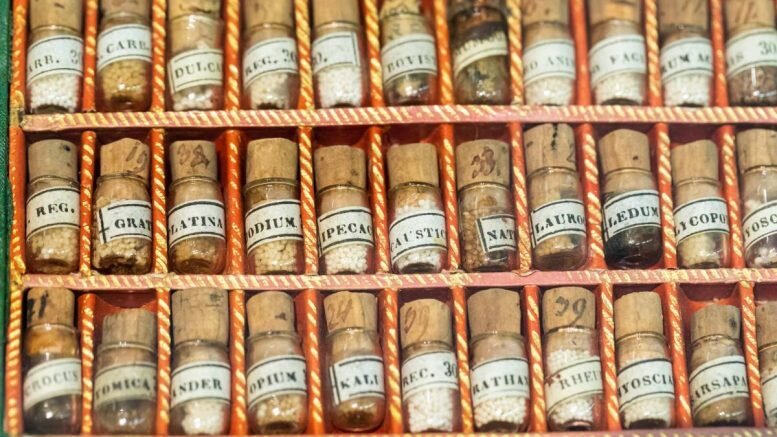From January 1, some 450 homeopathic medicines became readily available for sale outside of pharmacies. This is part of the growing government trend of acknowledging, and legislation for, less traditional healthcare systems and treatments. However, not everyone is happy.
The start of the New Year has ushered in what many think will become a new dawn for the complementary and alternative medicine sector in Norway.
Having been traditionally only sold in pharmacies, the liberalization of the sale of these medicines is seen as a huge win for Norway’s burgeoning complementary and alternative medicine (CAM) industry.
However, critics claim that homeopathic medicines show limited effectiveness and, in some cases, do more harm than good.
Norway Today takes a deep dive into homeopathic medicines: just what exactly are they and why is there such a fierce political and medical debate over their use?
Recent trends in Norwegian healthcare
It is safe to say that the healthcare system, in Norway, is of vital social and economic importance.
In 2019 alone, some NOK372 billion was spent on healthcare. This represents nearly NOK 70,000 per capita expenditure, one of the highest spends in Europe.
The healthcare system is based upon the principles of universal access, decentralization, and free choice of provider.
One only has to look at the healthcare system’s handling of the COVID-19 crisis to see why it is the envy of many countries worldwide.
Over the past two decades, previous and current Norwegian governments have tackled the issue of reforming the healthcare system. These reforms have focused on the empowerment of choice for patients and users.
This diversification of choice has led some healthcare professionals in Norway to start to provide complementary and alternative medicines and practices (CAMPs). These are practices and medicines outside the traditional healthcare system and normally intend to treat disease or injuries.
Norway has seen, in recent years, a boom in the CAMPs industry. In 2018 alone, some NOK 54 billion was spent on CAMPs, ranging from acupuncture to reflexology to naturopathy.
In an era of alternative facts, alternative news, and alternative narratives, it is no wonder that people are flocking to use alternative medicine.
Homeopathy: Historical roots but a modern phenomenon
Perhaps the most well-known practice in the CAMPs industry though is homeopathy. This is an alternative health system which though it has roots with “the father of medicine,” Hippokrates (460BCE-370BCE).
However, it was only later seriously developed by Samuel Hahnemann (1775-1843), a German physician.
The whole practice of homeopathy is based upon two central, albeit controversial, theories :
- Like cures like – the notion that the symptoms a substance is capable of causing it is then also capable of curing.
- Law of minimum dose – more of a guiding principle than a concrete medical law, the idea that a smaller dose of medication will have a greater amount of effectiveness.
It is with these two central theories that remedies are prepared. Homeopathic remedies, of which 450 are now readily available for sale, are made from either a mineral, plant, or animal element.
This element is then diluted drastically and biochemically “pacified.” Essentially, many of these “remedies” are mostly just made of sugar (normally lactose).
For example, a common generic homeopathic allergy pill, used to treat birch pollen allergies, contains only 1mg of a substance (magnesium, a mineral) in every 250-milligram pill.
The remaining 249 milligrams constitute only lactose monohydrates or, in layman’s terms, sugar.
Cheap, healthy, and natural or just diluted sugar?
Given the chemical make up then, what are some of the benefits of these homeopathic remedies?
According to the European Committee on Homeopathy (ECH), homeopathy “uses medicines that cover the disturbance of the whole person rather than giving different medicines for different afflicted parts of the body.”
The perceived benefits are numerous.
First and foremost, homeopathic remedies, unlike traditional prescription drugs, are low cost.
They are “generic, non-patented, and non-patentable medical substances, produced at low costs.”
Such remedies are now ever more accessible, with a cheaper price and a larger quantity, from health food stores to just a simple click of the mouse.
A second perceived benefit is the “safety” of such remedies. Homeopaths put a strong emphasis on the small dosage of a natural compound in each remedy.
This contrasts sharply with higher dosages of often synthetically fabricated compounds in traditional prescription drugs. Homeopaths believe that a lower dosage of the medicine will help stimulate the body’s natural recovery process.
A final benefit of these remedies is that they are seen as “healthy.” They tap into the growing trend of health-conscious consumption. As the key ingredients of these remedies are natural elements, heavily diluted, they are seen as a more “healthy” option than chemically synthesized traditional prescription drugs.
There is a plethora of dissent against homeopathy from the medical, political, and academic worlds.
The major perceived flaws of homeopathic remedies are that they have only one effect: the placebo effect. As the remedies are so diluted, and the ingredients present in such small dosages, it is argued that they have little impact or effect on the body. Furthermore, these remedies are often prepared by people with little, if at all any, formal medical education
The side effects of taking such remedies are well documented. A Norwegian study published in the BMC Complementary Medicine and Therapies journal showed that upon consumption of homeopathic remedies there is often a “temporary worsening of existing symptoms.”
Finally, using homeopathic remedies, instead of seeking out traditional medical help, to cure ailments or diseases, can mean a delay in traditional treatment. These ailments are then often treated too late, if at all, with conventional medicine.
Definitely a medicine… according to the European Union
In Norway, homeopathic remedies fall under the remit of the Act of Alternative Treatment of Illness, passed in 2003. The law aims to balance the safety of patients seeking alternative forms of medicine and treatment with the regulation of such care.
It recognizes that medical treatment can also be administered by non-medical professionals outside the traditional healthcare system.
Homeopathy as a regulated profession has been legislated in the European Union since 2001. Under the auspices of this EU legislation, homeopathic remedies are legally recognized as medicines.
Since Norway is a member of the European Economic Agreement, this definition has influenced Norwegian legislation on the matter.
However, as a counterbalance to this fact, the Norwegian parliament (Storting) agreed on the need for knowledge-based information on alternative medicine and treatments.
In 2005, the Norwegian Ministry of Health set up the National Research Centre for Complementary and Alternative Medicine (Nasjonalt forskningssenter innen komplementær og alternativ medisin, NAFKAM).
NAFKAM aims to provide the Norwegian public with researched-based objective information about all forms of alternative treatment and medicine.
The new government legislation, effective January 1, has changed the sale of homeopathic remedies slightly. They are still, in legislation, referred to as medicines but will now be sold under a scheme called “Medicines without a pharmacy” (Legemidler Utenom Apotek, LUA).
All outlets wanting to sell these medicines will have to obtain a permit from the Norwegian Medicines Agency and have approved marketing authorization. This is due to to the 2003 Alternative Treatment Act which stipulates that the marketing of such medicines can only be based upon factual and objective descriptions.
Unwarranted legitimacy and tentative support
Opinions for this liberalization of the sale of homeopathic remedies differ slightly.
The government’s spokesperson for health policy, Sveinung Stensland, in an interview in newspaper Aftenposten, said he believed “the products have as little effect as milk sugar.”
Furthermore, he wanted to continue the further regulation of the CAMPs industry which he labeled the “alternative jungle.” He believes that the sale of homeopathic remedies in pharmacies gave them an unwarranted legitimacy.
However, the Norwegian Pharmacy Association was in strong support of the new legislation. It too felt that the previous sale of these remedies in pharmacies only gave it an unjustified legitimacy.
Furthermore, the increased access and availability of these remedies, in locations other than pharmacies, can only benefit consumers.
Perhaps the final word should go to the chairman of the Norwegian Homeopaths National Association, Tore Fosso. He stated, in an Aftenposten interview, that “the effect of our medicines will be the same whether they are sold from pharmacies or elsewhere.”
For critics and champions of the remedies alike, a new dawn beckons.
The liberalization of the sale of these remedies is either encouraging safe and healthy healing or promoting snake oil potions.
One thing is for sure, the debate on the merits and effectiveness of homeopathic remedies isn’t going away anytime soon.
Now, if only there was a (diluted) solution for that…
Source: © NTB Scanpix / #Norway Today / #NorwayTodayNews




Be the first to comment on "A new era starts for homeopathic medicines in Norway"